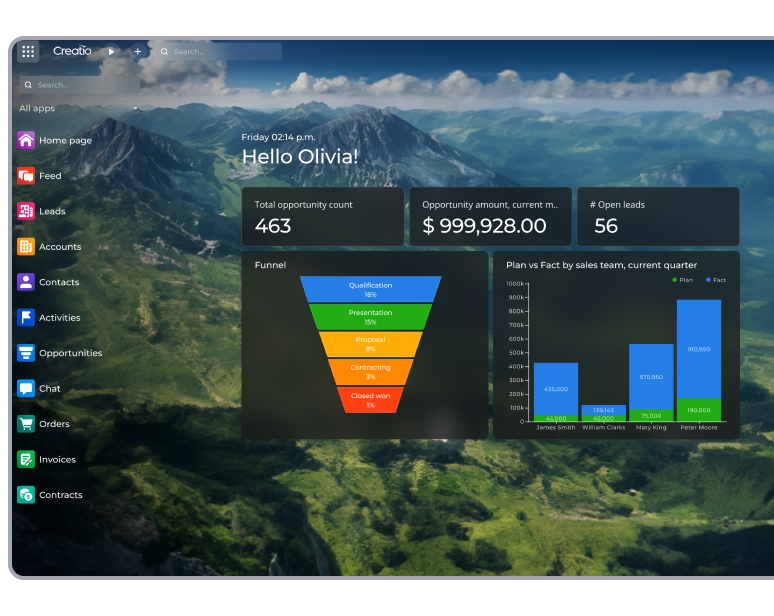-
No-Code
Platform
-
Studio
No-code agentic platform delivering the fastest time-to-value and the highest ROI
-
Studio
-
AI-Native CRM
CRM
-
AI-Native CRM
New era CRM to manage customer & operational workflows
CRM Products -
AI-Native CRM
- Industries
- Customers
- Partners
- About
Close More Deals With Creatio.ai

According to research by McKinsey, AI sales tools have the potential to increase leads by more than 50%, reduce costs by up to 60%, and cut call time even up to 70%, resulting in significantly higher sales productivity and profitability for businesses that implement AI-driven solutions. It’s no surprise that decision-makers are taking notice - 67% are already deploying AI agents, with sales (14%), marketing (13%), and service (12%) teams leading the way.
In this article, we explore the impact of AI in sales, its applications, the significant benefits it offers, and a review of some of the best AI tools available, along with an actionable roadmap for successfully adopting AI for sales. Find out more about how sales Artificial Intelligence can empower your sales team to achieve greater sales success and efficiency!
Key Takeaways:
- AI is revolutionizing sales efficiency and performance - from lead generation to forecasting, sales AI tools and agents are reshaping how sales teams operate - boosting productivity, reducing costs, and improving customer engagement.
- AI agents are the new digital team members - they automate repetitive tasks, analyze data, and provide intelligent recommendations, enabling sales reps to focus on building relationships and closing deals.
- Businesses are shifting from being AI-versed to AI-first - with the rise of no-code agentic platforms, organizations can now deploy, customize, and scale AI agents faster and more easily than ever before.
- The future of AI for sales is autonomous and conversational - Gartner predicts that by 2027, 95% of sellers’ research workflows will begin with AI, and by 2028, 60% of B2B sales tasks will be executed through AI-powered conversational interfaces.
What is AI in Sales?
AI in sales is an artificial intelligence technology that enhances and automates various aspects of the sales process, helping sales professionals work more efficiently and close more deals. AI agents are the most practical applications of AI in sales. By leveraging machine learning, natural language processing, and predictive analytics, AI can help sales teams streamline their workflows, automate repetitive tasks, gain deeper customer insights, and ultimately increase revenue.
AI in sales encompasses a range of applications. One primary use is in Customer Relationship Management (CRM) systems, where AI algorithms can analyze customer data to predict behaviors, preferences, and potential outcomes.
For instance, a sales manager can use AI to analyze sales calls and identify which leads are most likely to convert into paying customers based on past interactions, demographic information, and purchasing patterns. This helps prioritize sales efforts on high-value prospects to improve conversion rates and sales efficiency.
The State of AI Agents & No-Code
Learn how 560+ leaders across the world use AI and no-code to drive innovation today
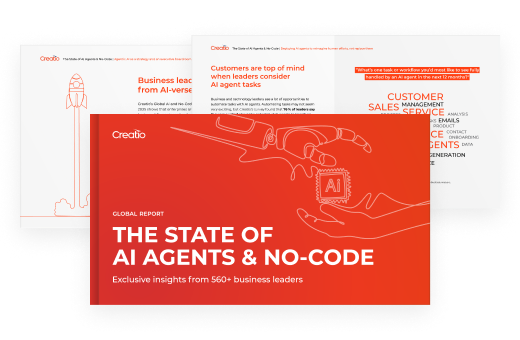
Types of Sales AI
Here are the key types of AI transforming sales operations:
- Machine Learning (ML) - allows AI to continuously learn from data, assess its performance, and improve decision-making over time. It can be used to automate routine tasks, personalize recommendations, and optimize sales strategies.
- Natural Language Processing (NLP) – enables AI to understand human language, process it, and provide output. NLP can derive insights from emails, calls, and customer interactions.
- Conversational AI - leverages natural language processing (NLP) and machine learning to communicate with customers via chatbots in natural language to mimic human interactions. Conversational AI receives and analyses customer input and delivers instant responses.
- Generative AI - uses deep learning models to create text, images, and other forms of content. Generates unique sales materials such as proposals and emails.
- Predictive AI - uses machine learning to analyze historical sales data, recognize patterns, identify trends, and forecast future outcomes.
- Agentic AI - autonomously makes decisions and takes actions with minimal human intervention. By analyzing real-time data, agentic AI executes and optimizes sales workflows, enabling intelligent process automation.
- Computer Vision – uses AI to interpret and analyze visual data from images and videos.
By adopting a combination of these AI technologies, sales organizations can improve their sales efforts and gain a significant competitive advantage.
How Can You Use AI in Sales?
AI's integration into sales processes has opened numerous possibilities for enhancing efficiency and customer engagement. According to a recent Creatio report, The State of AI Agents and No-Code, 84% of business leaders agree that implementing AI agents not only drives productivity but also fosters growth opportunities for existing employees and creates entirely new roles within their organizations.
Here are several key use cases demonstrating how AI can be utilized in sales:
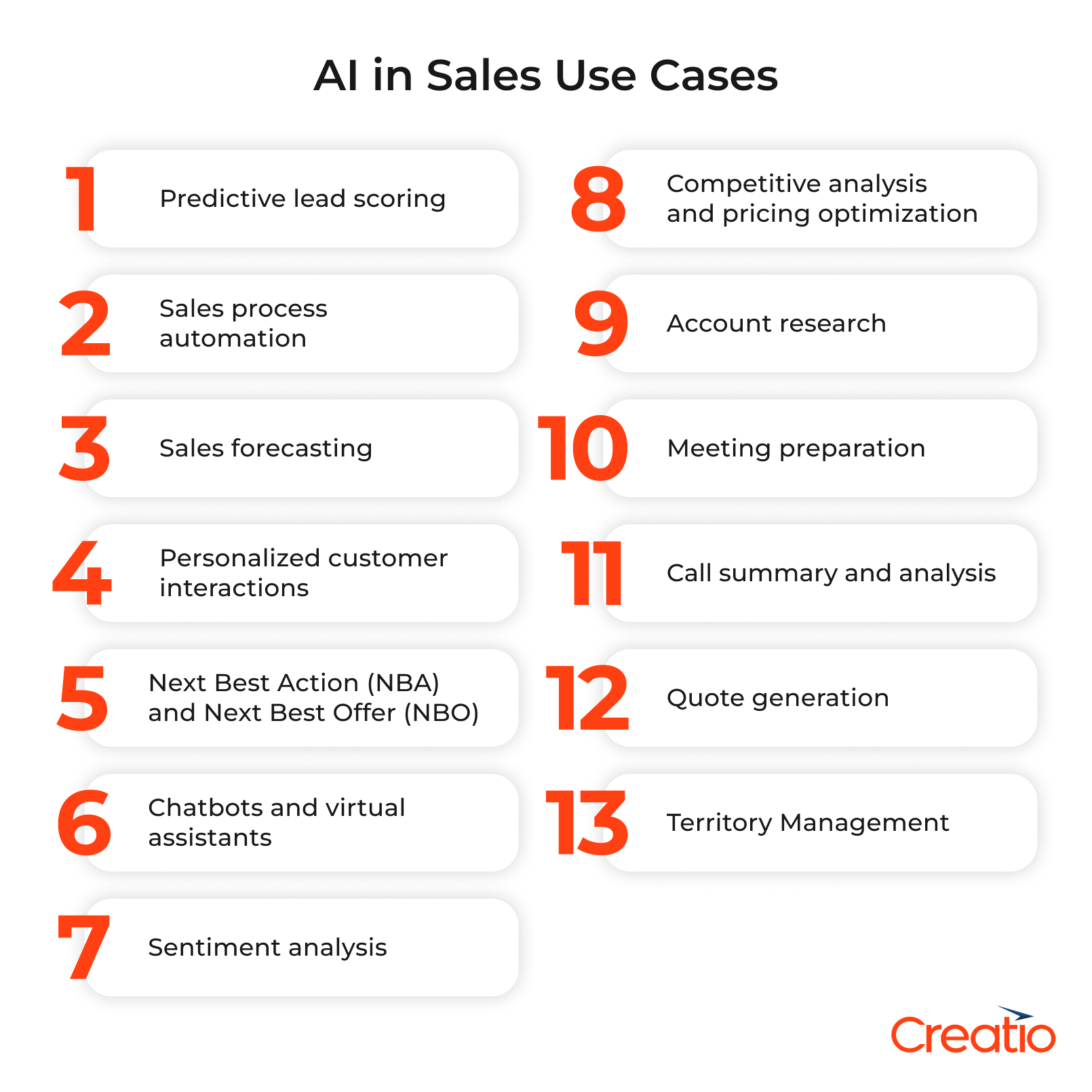
Predictive lead scoring
One of the applications of Artificial Intelligence in sales is predictive lead scoring, which is the practice of ranking prospects based on their potential value and likelihood to convert into customers. Traditional lead-scoring methods often rely on manual processes and intuition, which is time-consuming and can be prone to error.
Sales AI changes this by using machine learning algorithms to analyze vast amounts of data, including past interactions, demographic information, and website behavior. Autonomous AI agents can automatically evaluate leads and adjust scoring criteria in real time to accurately reflect their value.
According to Gartner, sellers who can effectively use AI for sales prospecting are 3.7 times more likely to meet their sales quotas.
By evaluating collected information, AI can accurately predict which leads are most likely to convert into customers. This enables sales teams to focus their efforts on high-potential prospects, improving conversion rates and maximizing sales.
According to McKinsey, sales professionals who use AI reported a 50% surge in leads and appointments, which helped them increase their business profitability over time.
Lead and opportunity management
AI sales tools help sales teams manage and track leads and opportunities, ensuring that no potential deal falls through the cracks. Sales AI agents tracks the progress of leads through the sales funnel, offering real-time insights and alerts about important activities or milestones that need attention. It also collects and summarizes key lead details and interactions, reducing the risk of missing important information. AI agents can also optimize activities across the sales pipeline, automate lead distribution and follow-ups based on AI-driven insights and recommendations.
Account research
AI for sales automates account research by gathering, analyzing, and summarizing key information about prospects and organizations. Instead of spending hours reviewing websites, LinkedIn profiles, and news updates, sales teams can use AI agents to gather relevant insights.
With access to real-time data, sales professionals can enter conversations fully prepared and tailor their approach to each account’s unique needs and priorities.
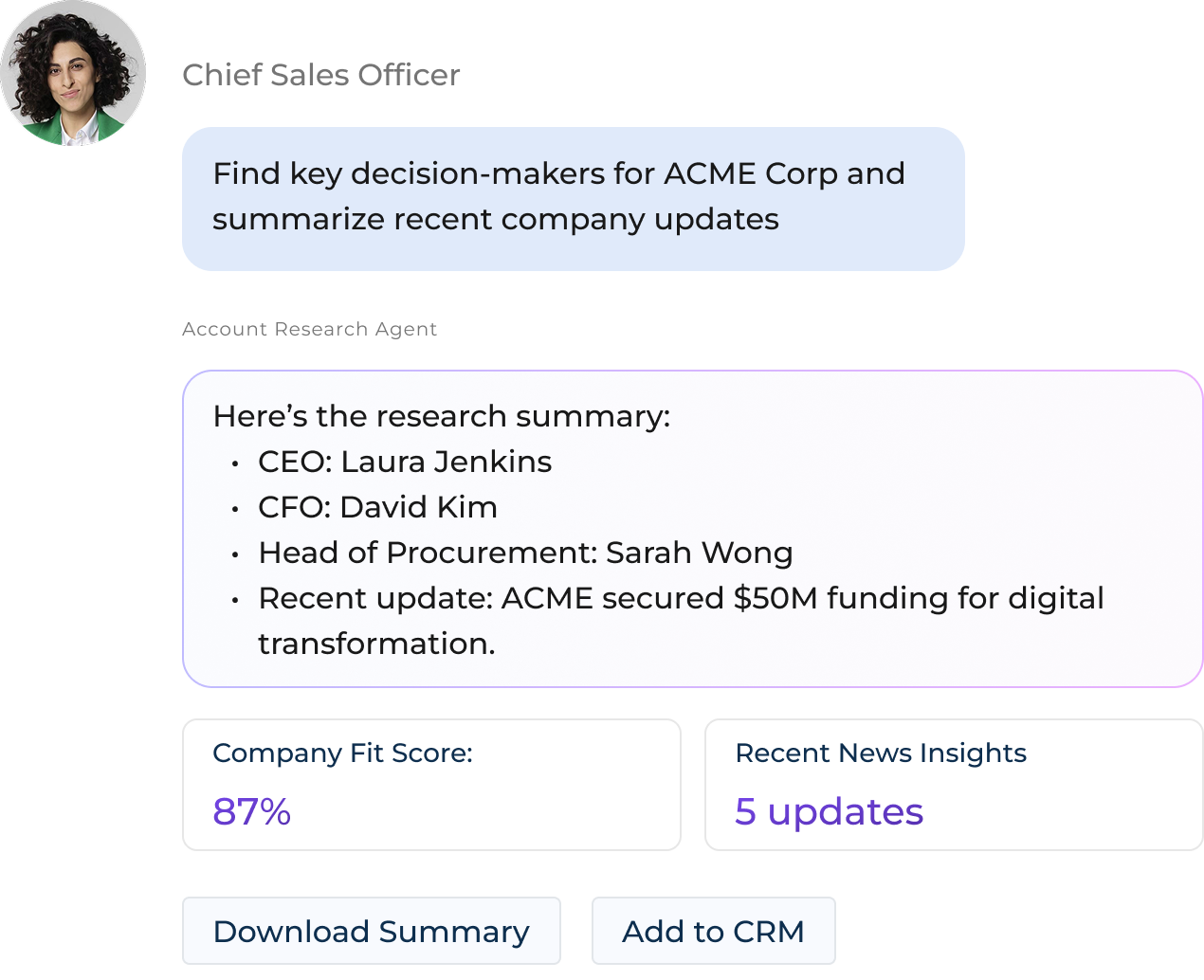
Sales outreach
AI for sales supports sales teams in their efforts to engage and build relationships with potential customers by making outreach more targeted and personalized. AI can analyze large volumes of data, such as firmographic information, behavior, and past interactions with the company, to identify potential prospects. It compares this information with the ideal customer profile and prepares a list of contacts worth pursuing.
AI agents not only speed up the process of finding the right prospects but can also automate much of the outreach efforts. They can generate personalized messages tailored to each prospect, and send them at the right time through the right channels.
AI tools can also schedule initial meetings and automatically send follow-up emails to ensure prospects stay engaged. Integrating AI into the outreach process allows sales teams to maintain consistent, personalized communication at scale.
Sales process automation
AI workflow automation can handle many repetitive sales tasks, increasing efficiency and reducing the likelihood of human error. This includes tasks such as data entry, follow-up emails, meeting scheduling, and report generation.
Thanks to the advancement in AI technology, businesses can now use agentic AI to autonomously automate these tasks with minimal human involvement. AI agents can make intelligent decisions to execute specific workflows based on data analysis and real-time inputs, streamlining sales processes even further. For example, an AI agent could automatically prioritize leads and send follow-up emails tailored to each lead’s specific needs, without requiring human sales reps to make a decision or provide input. Gartner predicts that by 2030, 80% of sales leaders will consider the integration of AI into sales workflows as a crucial aspect of achieving competitive advantage.
By automating these routine tasks, sales AI tools help sales reps spend more time selling and less time on administrative work.
BCG in its AI Radar - global research of 1,803 C-level executives on AI in 2025 - reported that 67% of enterprises are considering autonomous agents as a crucial part of their AI transformation.
Personalized product recommendations
Based on customer insights derived from client data, previous sales, shopping habits, online behavior, and interactions with the company, sales AI can offer relevant product recommendations. By leveraging machine learning algorithms, sales AI continuously learns from customer interactions and refines its recommendations over time to make the most accurate suggestions at any given time.
For instance, if a customer has shown interest in a particular product category or has recently purchased an item, AI can suggest complementary products or upgrades that align with their tastes and buying patterns. This personalization creates a more engaging and relevant shopping experience, fostering customer loyalty and encouraging repeat business.
Meeting preparation
Instead of manually gathering customer details, past interactions, and deal history, sales teams can use AI agents to prepare a comprehensive briefing before every call or meeting. The agent will analyze CRM data, communication records, and behavioral insights to summarize attendees' information, open opportunities, and recent pain points.
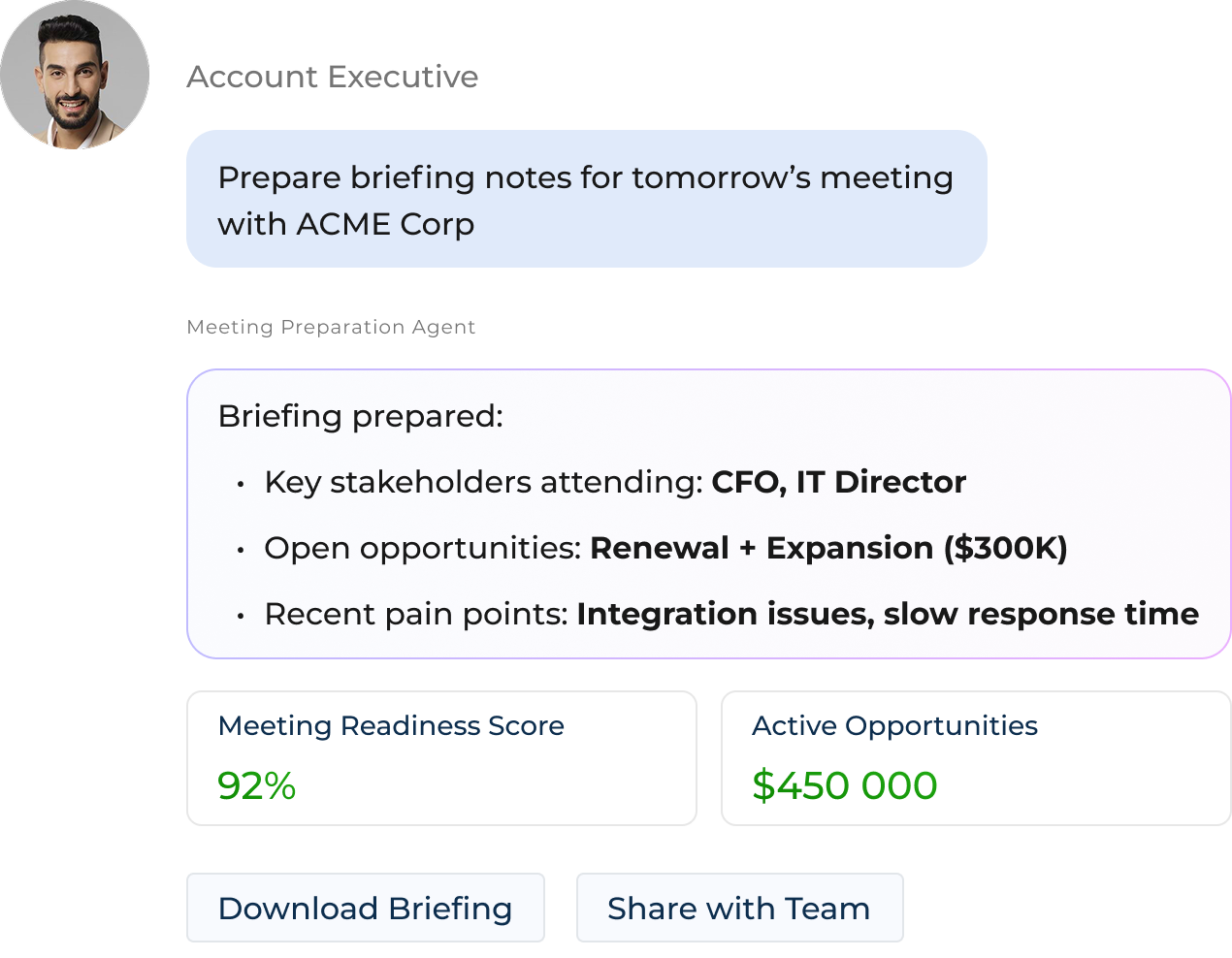
For example, before a client meeting, an AI agent can summarize recent emails, flag changes in engagement levels, and suggest tailored offers based on the customer’s previous purchases or industry trends. This enables sales representatives to enter every conversation fully informed, minimizing their preparation time.
Call summary and analysis
Sales professionals no longer have to divide their attention between engaging with potential customers and taking notes. AI for sales can not only prepare a transcript of the call but also summarize key takeaways and automatically update the CRM system and sales pipeline.
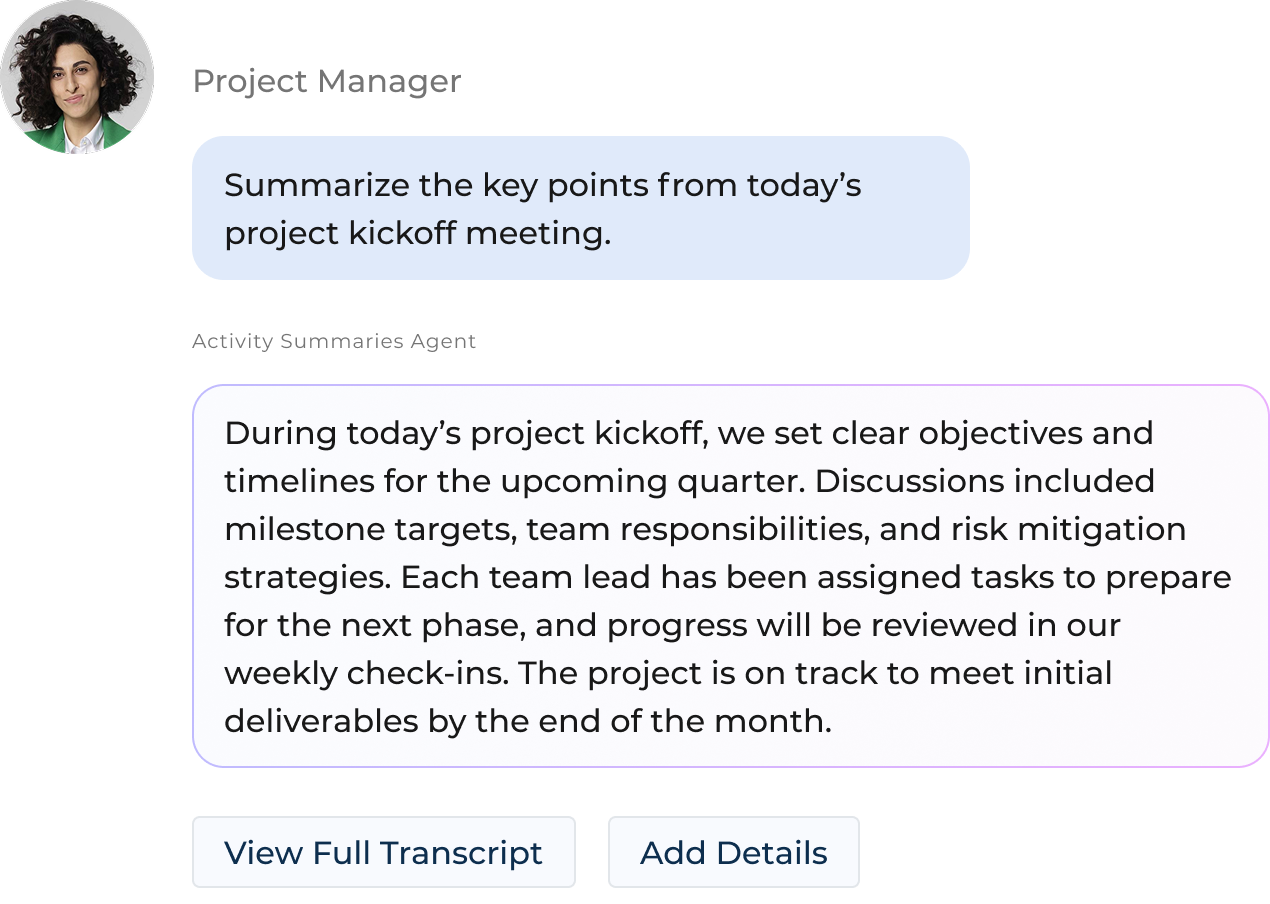
Based on the insights from calls, AI can also prepare a list of tasks and recommend the next steps to ensure a successful deal progression. It can also analyze emails, in-app messages, and follow-up calls to update key information, ensuring sales reps have access to the most up-to-date knowledge.
Additionally, by analyzing sales calls AI can identify common questions, pain points, customer needs, and complaints. Based on this information, AI sales tools can prepare actionable insights that can be used to improve offers, sales calls, presentations, products, knowledge base, etc.
Quote generation
Creating accurate and timely quotes is a critical but often time-consuming step in the sales process. AI agents can streamline this by automatically generating personalized quotes based on customer requirements, pricing rules, and historical deal data. By integrating with the CRM system, AI ensures every proposal reflects current discounts, product availability, and approval workflows.
For instance, when a prospect requests a quote, an AI agent can instantly pull relevant data, calculate pricing, and produce a polished proposal ready for review or delivery. This not only reduces manual errors and approval delays but also enables sales teams to respond more quickly.
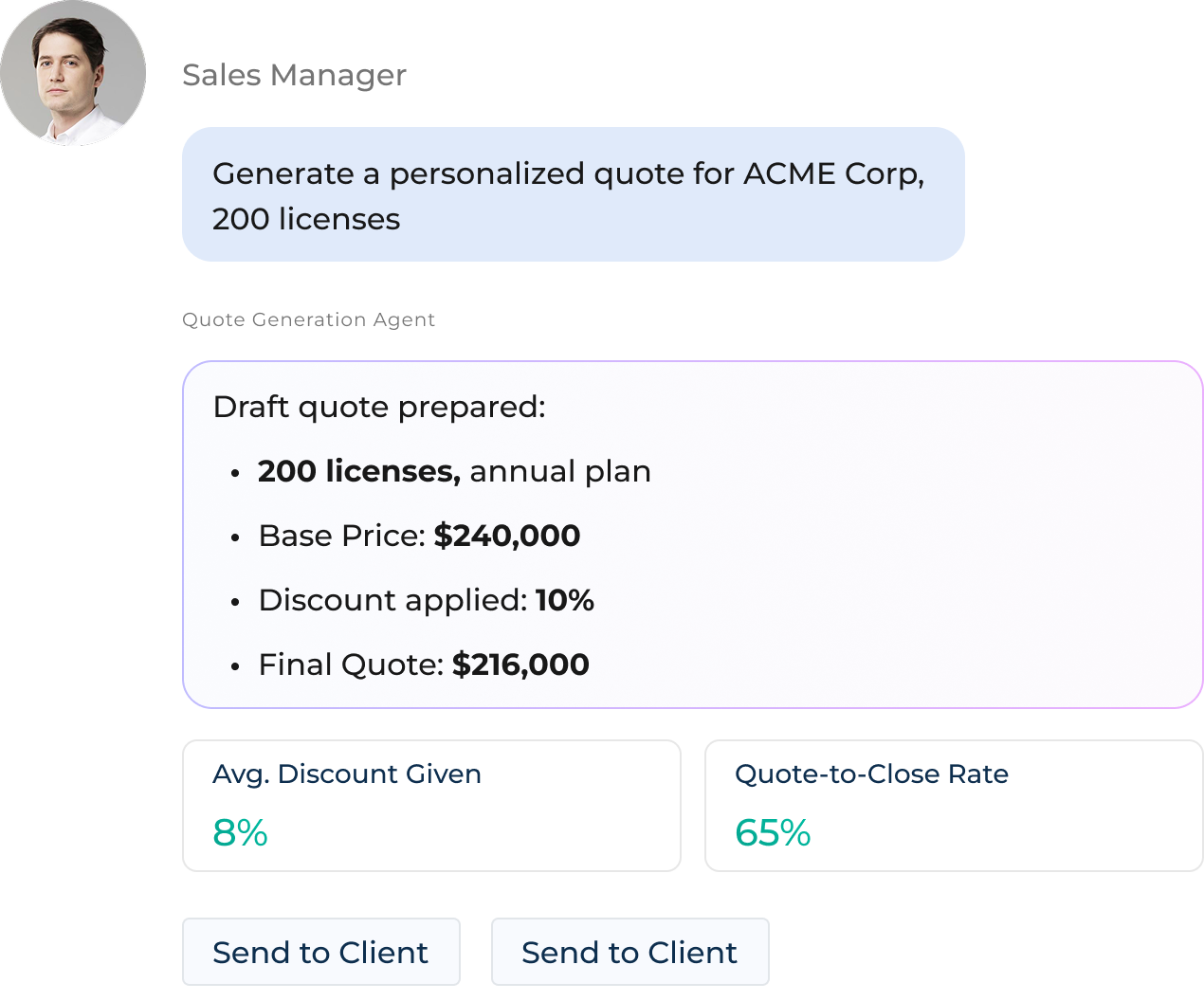
Personalized content creation
Generative AI for sales supports creating personalized sales content at scale. Thanks to generative AI capabilities, sales teams can quickly create relevant materials to engage with customers and prospects throughout the whole sales cycle.
AI can generate emails, sales offers, knowledge articles, sales playbooks, case studies, presentations, and many more. One of the key advantages of using AI for content creation is the ability to easily adapt messaging to targeted languages, regions, industries, etc. This way even global businesses operating in multiple regions with thousands of customers worldwide can offer personalized content.
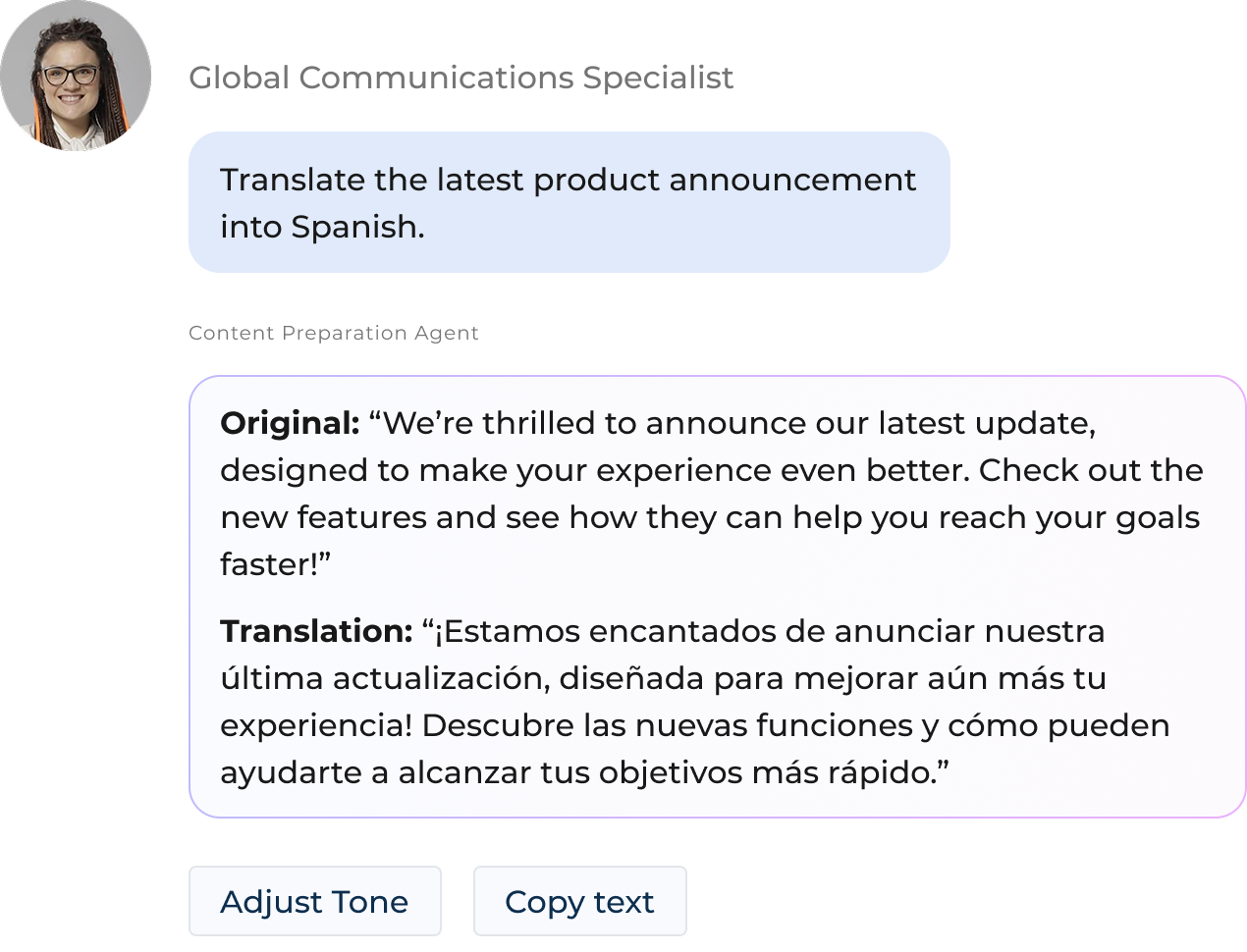
For example, AI can send personalized emails to a potential client who expressed an interest in the company’s products or services. Sales AI tools can collect and analyze information about them and adapt the standard first contact message to address their potential pain points, industry trends, challenges, etc. The same message can be automatically translated to different languages, localized to fit targeted markets, and sent to similar clients and prospects around the world.
With automatically generated content personalized to each customer and potential client, sales teams can significantly increase engagement and chances of closing a deal.
According to Gartner, by 2026, B2B sales organizations using generative AI for sales will reduce the time spent on prospecting and customer-meeting prep by over 50%.
Data analysis and sales intelligence
Sales AI tools provide sales teams with invaluable insights that enable smarter decision-making and performance improvement. AI can process much more data much faster than any data analyst, which is crucial for business agility.
AI sales tools analyze data regarding customers, market trends, economic fluctuations, and historical sales to identify new opportunities and challenges. Businesses can use these actionable insights to optimize their sales strategies and introduce new products and services.
Sales forecasting
AI sales forecasting empowers effective business planning. Sales Artificial Intelligence enhances forecasting accuracy by analyzing historical data, market trends, and external factors such as seasonal changes.
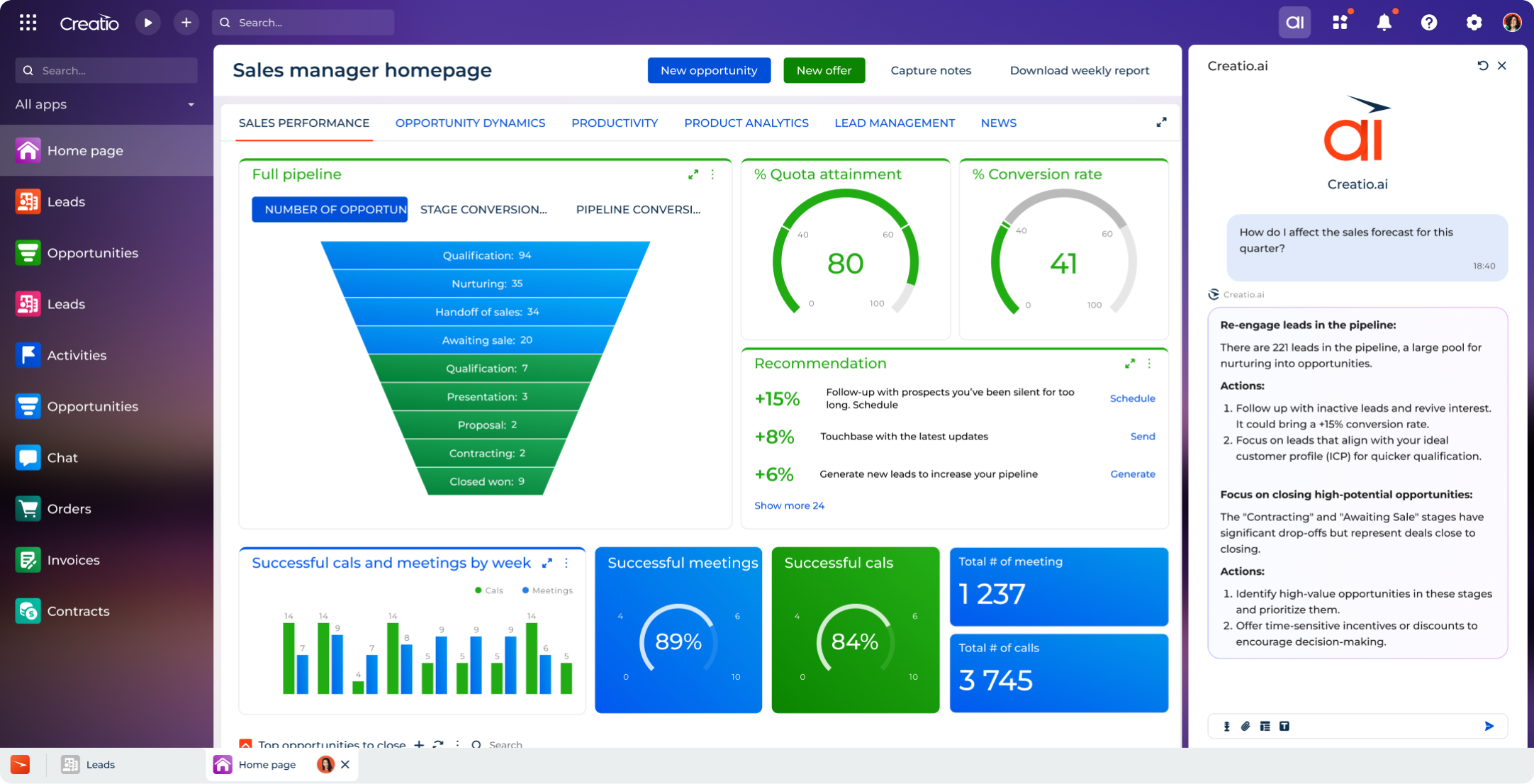
The AI-driven insights allow businesses to predict future sales with greater precision. This capability helps in setting realistic sales targets, optimizing inventory levels, and making informed strategic decisions. AI tools can also provide sales forecasts that adapt to changing market conditions, ensuring businesses can stay agile and responsive in today’s dynamic marketplace.
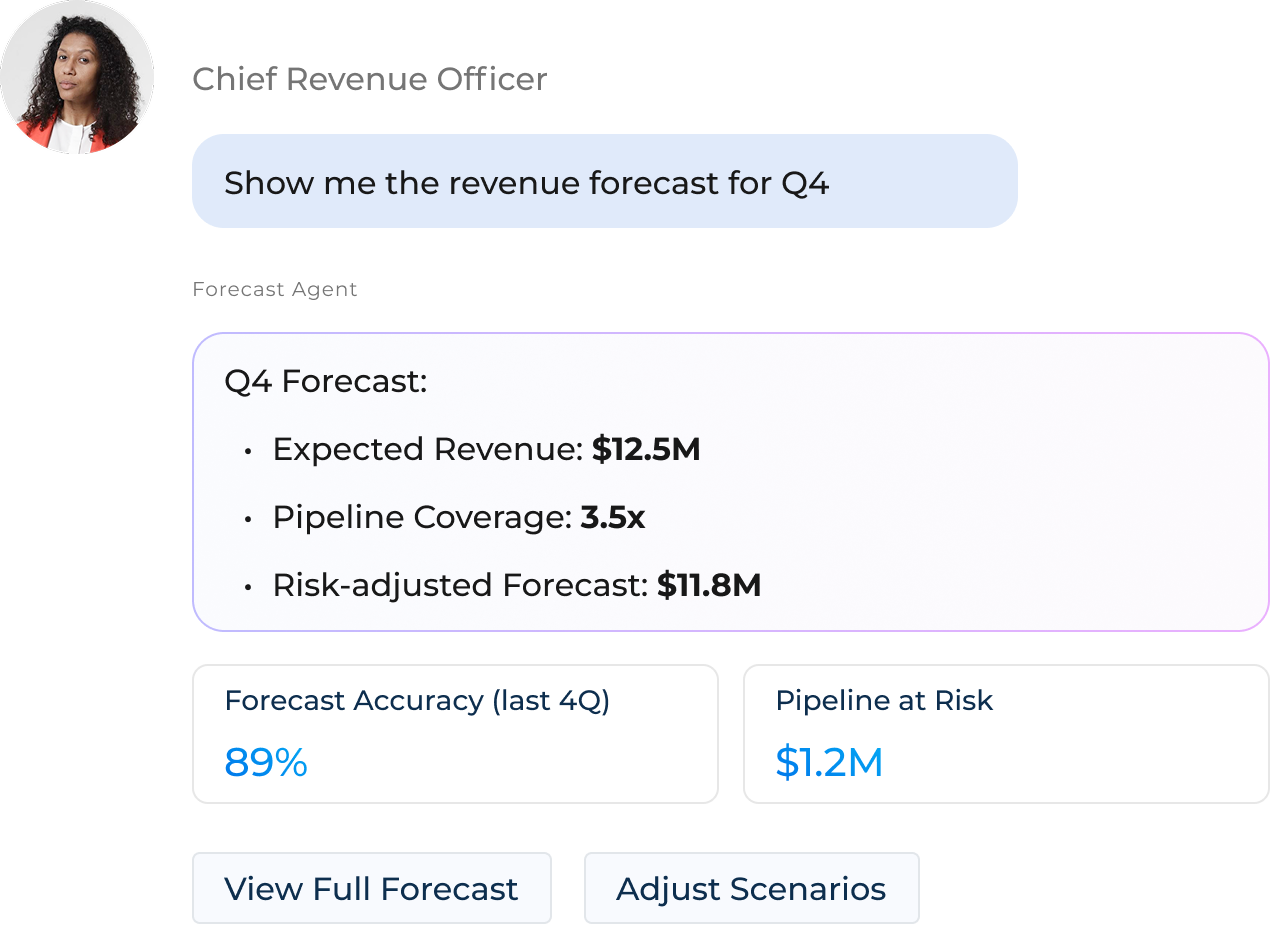
Personalized customer interactions
AI enables a high degree of personalization in customer interactions, which is essential for building strong customer relationships and driving sales. By analyzing customer data, AI can create detailed profiles of individual customers, including their preferences and purchase history, to craft messages, recommendations, and offers that resonate with each individual buyer.
Instead of relying on static templates, AI dynamically generates personalized emails, proposals, and follow-ups that reflect a customer’s specific interests and stage in the buying journey. It can adjust tone, timing, and messaging based on real-time insights, ensuring every interaction feels authentic and relevant.
For example, an AI agent can automatically draft a tailored follow-up email after a demo, highlight the product benefits most aligned with that customer’s pain points, or suggest custom offers based on recent engagement trends.
Next Best Action (NBA) and Next Best Offer (NBO)
AI's ability to analyze vast amounts of data and predict outcomes makes it a powerful tool for determining the next best action (NBA) and next best offer (NBO) for sales teams. These AI-driven strategies enable businesses to engage customers more effectively by providing personalized recommendations and timely actions.
AI can determine the most appropriate interaction with a customer at any given moment, offering sales representatives the next best action tips, such as sending a follow-up email, making a phone call, or offering a discount to optimize customer engagement.
For example, a sales AI agent can connect with Outlook to scan all emails exchanged with the prospect, determining the deal stage and recommending the next action the sales representative needs to take to move the deal forward. Thanks to the natural language interface, the task doesn’t require setting up or coding; sales reps can simply ask the agent, “What is the next step for [prospect name]?” or “What actions are needed to move this opportunity from [stage] to [stage]?”, and AI will do the rest.
An AI agent can also recommend products or services that a customer is most likely to purchase next based on their purchase history and preferences.
Find out more about AI-powered recommendations.
Territory management
For sales leaders, managing territories isn’t just about dividing regions, but maximizing team performance. AI agents empower managers with real-time visibility into territory health, workload balance, and individual performance metrics.
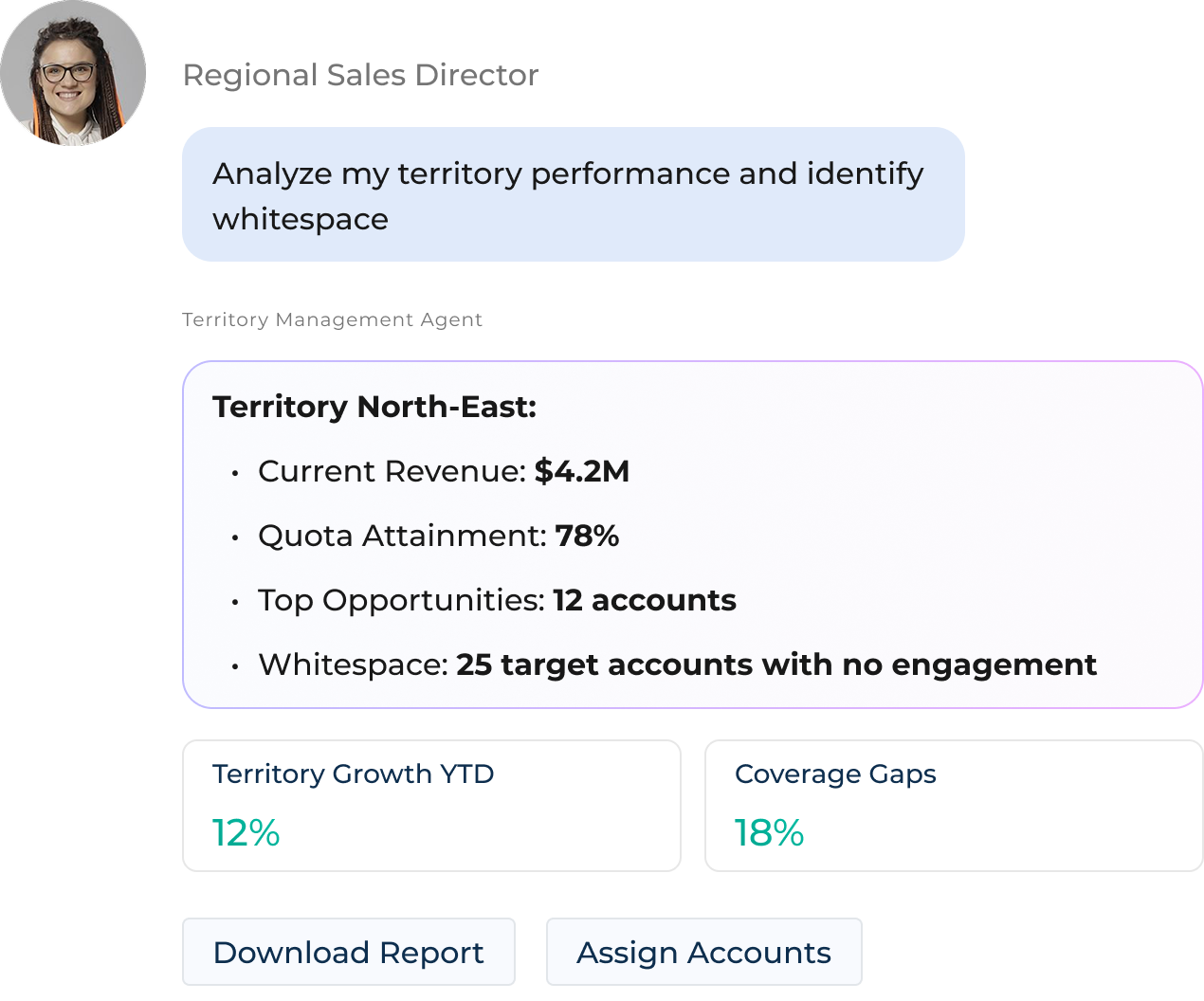
By analyzing sales data, market potential, and customer engagement patterns, AI can identify which territories are over- or under-resourced and recommend smart reassignments. Managers can use these insights to optimize coverage, balance quotas, and align experience with opportunity.
For example, an AI agent might alert a manager that one representative is covering too much ground, while another has untapped territory potential, suggesting adjustments to maintain consistent performance. This data-driven approach enables leaders to make faster, more informed decisions.
Chatbots and virtual assistants
AI-powered chatbots and virtual assistants are transforming the way businesses interact with customers. These tools can handle a wide range of tasks, from answering common queries and providing product recommendations to processing orders and scheduling appointments.
Natural Language Processing (NLP) plays a crucial role in enhancing the capabilities of these AI tools. NLP enables chatbots to understand and interpret human language, making interactions more intuitive and effective. This technology allows chatbots to engage in meaningful conversations, understand customer needs, and provide relevant responses.
Additionally, chatbots can operate 24/7, ensuring that customers receive assistance at any given time. This way, AI sales technology can help businesses engage with website visitors in real time, improving lead generation and boosting customer satisfaction.
Sentiment analysis
Understanding customer sentiment is crucial for crafting effective sales strategies. AI can analyze customer communications, such as emails, social media posts, and reviews, to grasp their sentiment toward a brand or product.
Sentiment analysis uses NLP to interpret the emotions expressed in text. By identifying positive or negative sentiments, sales reps can proactively address customer concerns, enhance customer experiences, and tailor their approaches to better meet clients' needs.
Competitive analysis and pricing optimization
AI can analyze competitors' pricing strategies, market demand, and customer purchasing behavior to optimize pricing strategies. This ensures that products are priced competitively to maximize sales and profits.
Artificial Intelligence in sales provides real-time pricing recommendations, helping businesses stay competitive and responsive to market changes. For example, dynamic pricing algorithms monitor prices in real-time and provide sales leaders with suggestions based on market conditions and competitor activity.
How to Implement AI in Your Sales Strategy
While the benefits of AI for sales are undeniable, many organizations still face challenges when implementing these solutions. According to a recent Creatio report, the most common barriers include data quality and system integration (51%), followed by change management (26%), and unclear ROI (18%).
Overcoming these challenges requires a structured, phased approach to ensure long-term success.
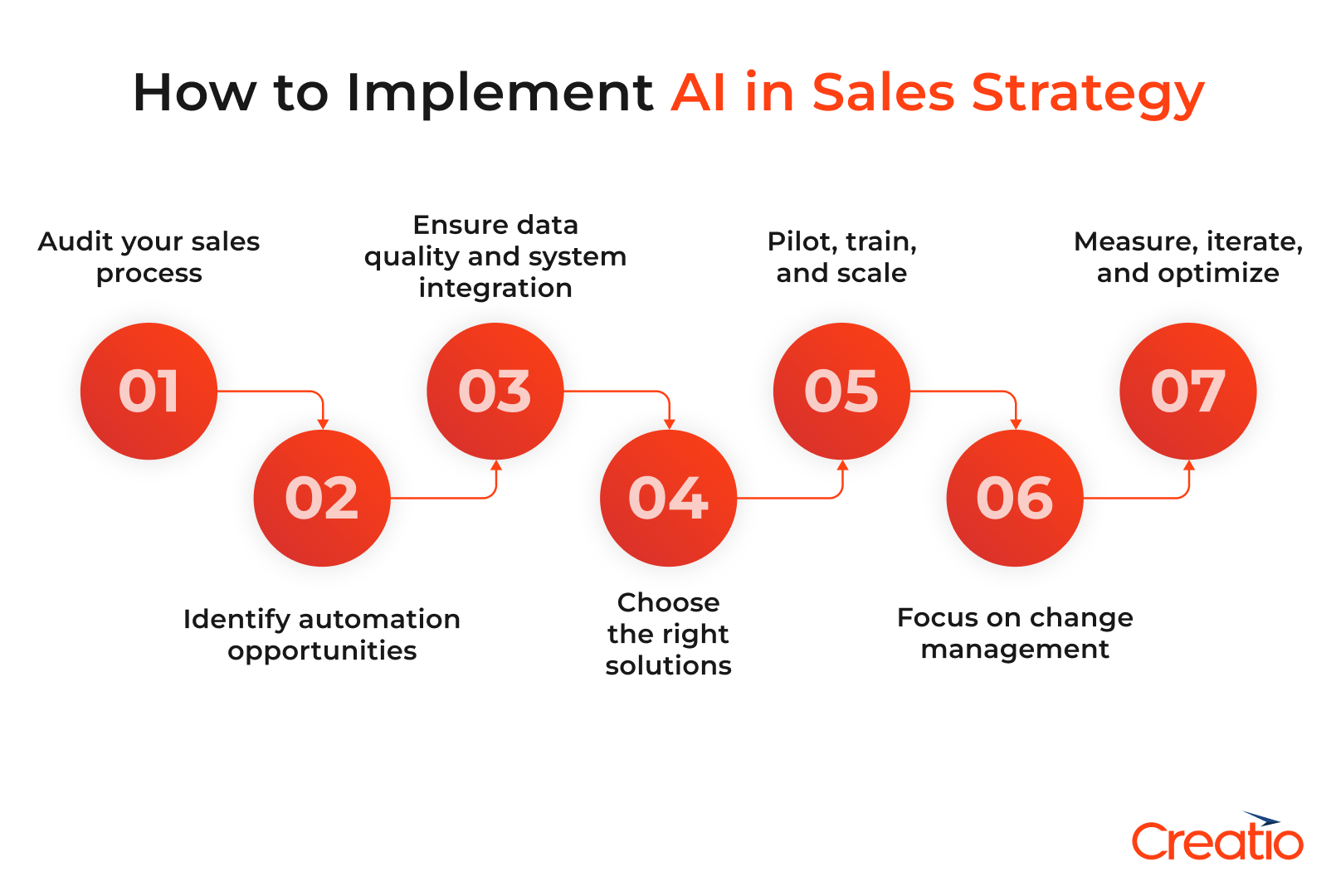
1. Audit your sales process
Start by mapping out your current sales workflows from lead generation to deal closure. Identify all inefficiencies, manual handoffs, or data silos.
This step will help you clearly identify your pain points and reveal areas where AI can deliver the greatest impact - whether in forecasting, lead qualification, or customer engagement.
2. Identify automation opportunities
Once your process is mapped, look for repetitive, time-consuming tasks that can be automated. This could include lead scoring, follow-ups, quote generation, data entry, etc.
By automating routine activities with AI agents, your sales team can focus more on building relationships and closing deals, rather than on administrative tasks.
3. Ensure data quality and system integration
AI thrives on high-quality, well-structured data. Audit your CRM and connected systems to eliminate duplicates, fill gaps, and unify customer information.
Proper integration between all the systems in your technology stack ensures that your AI models have a single source of truth, making predictions and insights far more accurate and reliable.
4. Choose the right solutions
Selecting the right technology is crucial. Look for an agentic CRM platform, such as Creatio, that enables seamless integration with your existing tools and provides flexibility to customize and scale.
A platform like Creatio empowers teams to easily automate workflows, deploy ready-to-use and custom AI agents, and quickly adapt to evolving sales processes, without heavy IT involvement.
Discover how Purplebricks leveraged Creatio agentic CRM
to increase lead volume by 35% and boost lead conversions by 50%, with intelligent automation and targeted engagement
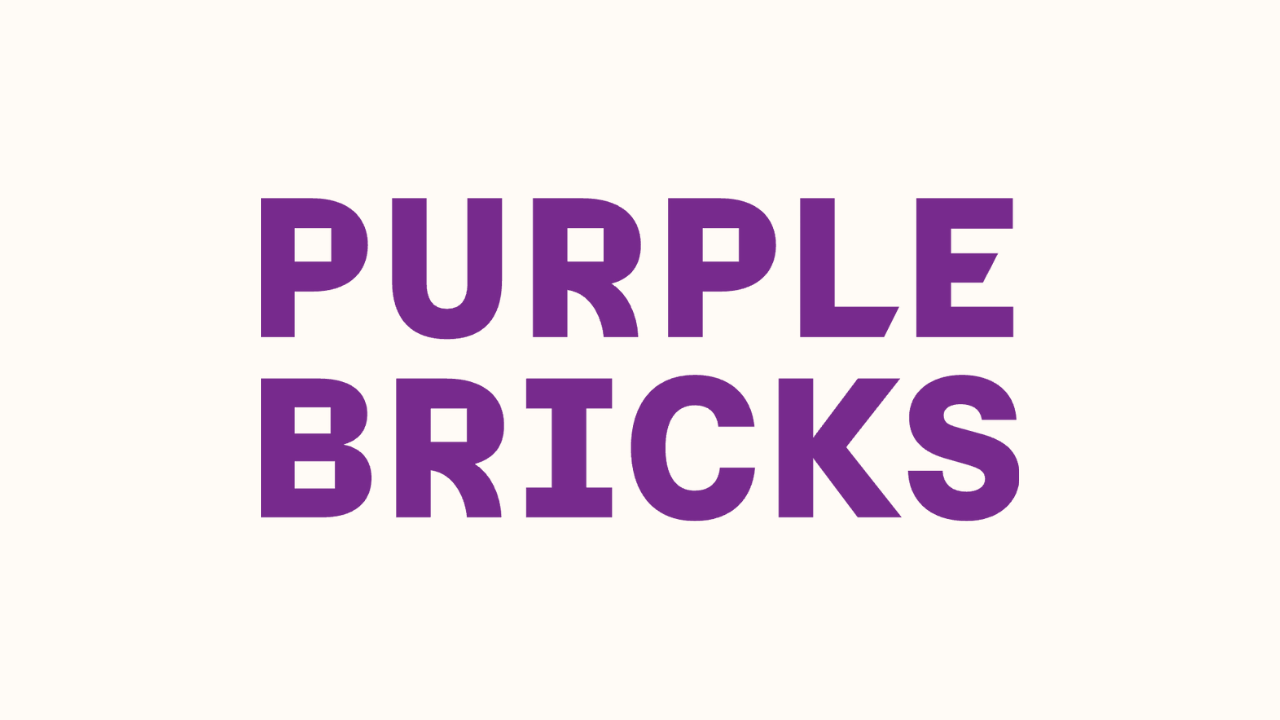
5. Pilot, train, and scale
Start small with a focused sales AI pilot, such as automated lead scoring or next-best-offer recommendations. Train your team on how to interpret and act on AI-driven insights, then measure performance improvements.
Once you see measurable gains, expand the initiative across other sales functions and regions. This phased approach ensures adoption at every level and builds confidence in the technology. If you choose an agentic platform, you can accelerate the adoption by up to 70%, compared to inefficient, legacy solutions.
6. Focus on change management
AI transformation succeeds when people embrace it, so make sure you communicate the vision clearly and provide ongoing training.
Only executive-level vision and commitment can ensure that AI agent initiatives receive adequate funding, cross-functional collaboration, and the long-term strategic focus necessary to realize their full transformational potential rather than being relegated to departmental pilot projects with limited impact. - Creatio The State of AI Agents and No-Code report
Build a culture of collaboration and innovation, where AI empowers people instead of replacing them. According to the Creatio research, just 11% of business and technology decision-makers anticipate notable staff reductions from adopting AI agents, underscoring that AI’s true potential lies in augmenting human potential, not replacing it.
7. Measure, iterate, and optimize
Establish clear KPIs from the start. This can include conversion rates, deal velocity, forecast accuracy, etc. Make sure you review the performance regularly, and use the insights from your pilots to fine-tune models, optimize processes, and scale what works.
Benefits of AI for Sales
Integrating AI and machine learning into sales activities offers plenty of advantages that can significantly boost key sales metrics. Numerous studies and industry reports underscore the substantial impact of AI on sales performance, demonstrating how businesses can leverage AI to drive growth and efficiency.
Here are some of the key benefits of AI in sales:
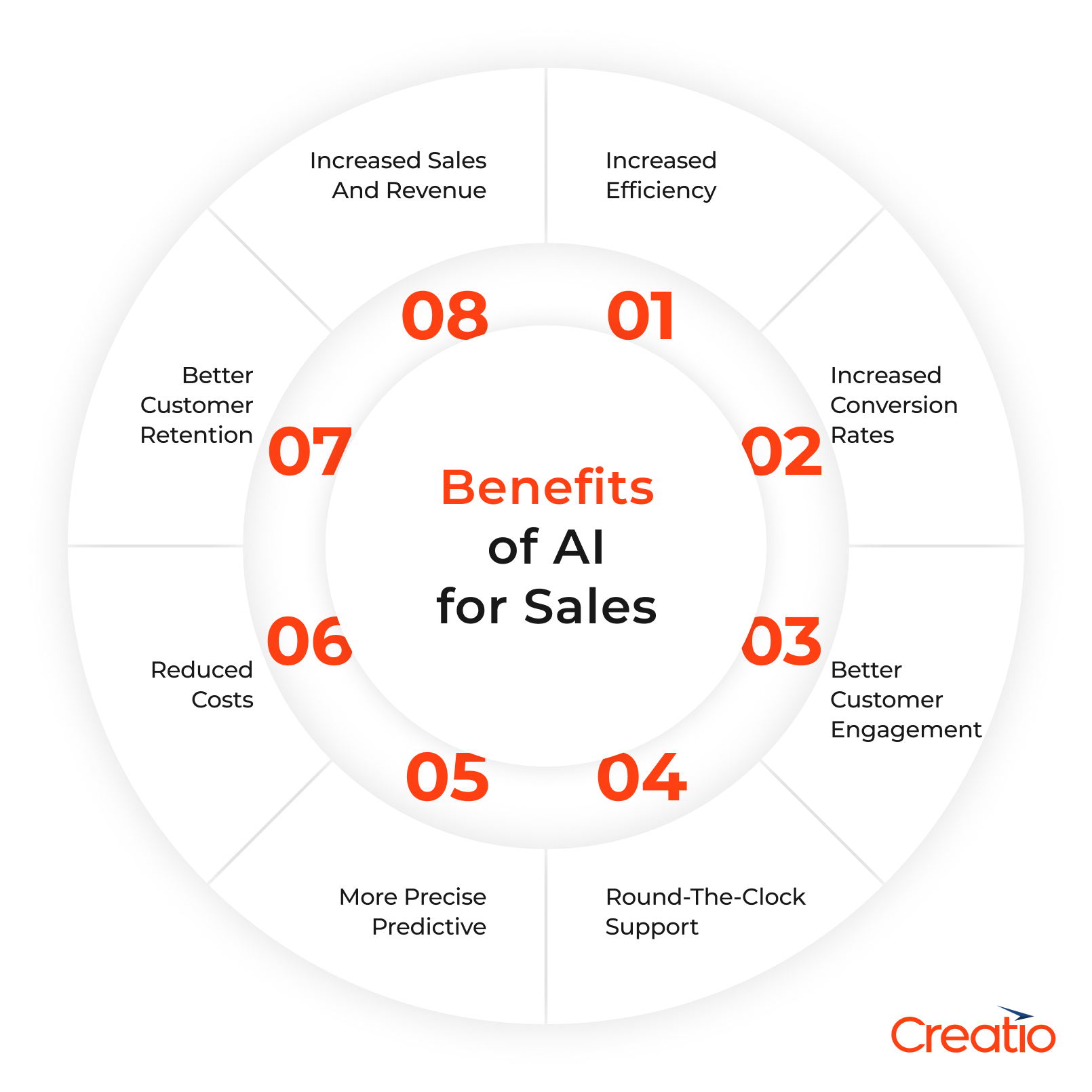
Increased efficiency
AI automates repetitive tasks like data entry, follow-up emails, and meeting scheduling, freeing up sales representatives to focus on high-value activities like building relationships and closing deals.
According to Deloitte, 33% of surveyed AI users reported a significant increase in efficiency and productivity thanks to streamlined business processes.
This increased efficiency allows businesses to expand their sales operations without employing additional workforce and allocating more resources. According to Forbes, businesses that implemented AI sales agents into their processes were able to automate up to 90% of all prospecting tasks, resulting in a significant increase in productivity and efficiency.
Increased conversion rates
AI tools help sales teams identify and prioritize the most promising leads. They can also provide personalized materials and recommend the next best action to enhance engagement with potential clients. By focusing their efforts on high-value opportunities, sales professionals supported by AI can increase the chance of conversion.
A study by Harvard Business Review indicates that companies utilizing AI for lead scoring see a 51% increase in lead conversion rates.
One of Creatio’s clients leveraged Creatio’s AI-native platform to automatically categorize and route thousands of daily leads, gaining real-time visibility into every opportunity. This enabled the discovery of multi-step opportunities from single customer requests, resulting in a 50% increase in conversion rate.
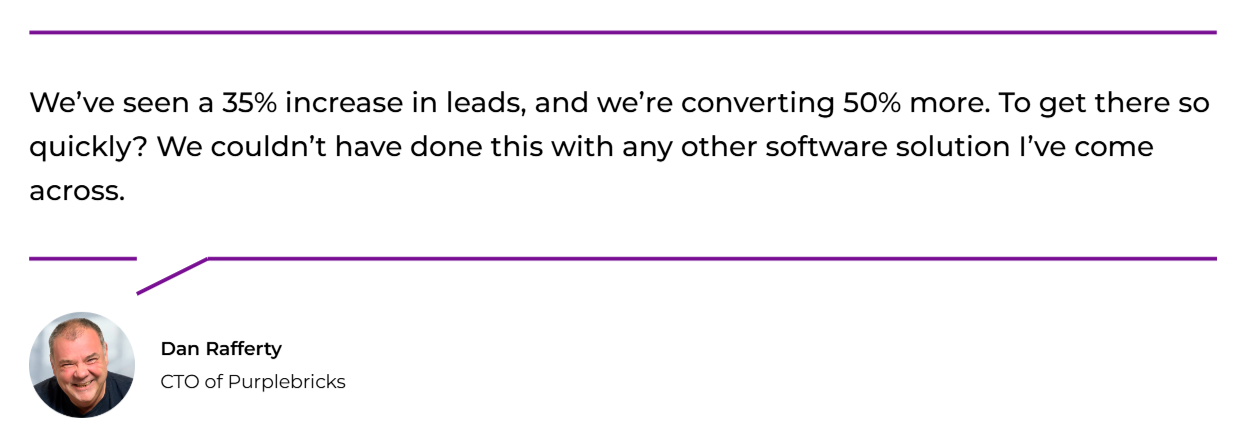
Better customer engagement
According to a McKinsey report, even up to 71% of consumers expect brands to deliver personalized interactions. Sales AI helps businesses meet these expectations by quickly analyzing vast amounts of customer data, deriving key insights, and delivering tailored recommendations and communications. This personalized approach improves customer engagement and satisfaction, leading to stronger relationships and higher sales.
According to the Nucleus report, thanks to Creatio’s intelligent automation capabilities, sales teams can quickly deliver personalized customer interactions, resulting in a 15% increase in engagement.
Round-the-clock support
AI-powered chatbots and virtual assistants are available to customers 24/7, providing timely assistance regardless of time zones or business hours. These AI tools can handle common questions, schedule meetings, send product demos, provide pricing information, and guide customers through the purchasing process, all without human involvement. Businesses that provide this round-the-clock support, can see improved customer satisfaction and retention.
Gartner predicts that by 2025, AI will handle 95% of customer interactions, enhancing responsiveness and customer experience.
More precise predictive forecasting
AI can analyze vast amounts of historical sales data and market trends to deliver more precise sales forecasts. It can provide real-time insights about expected revenue, sales performance, potential risks, and opportunities, helping sales leaders make data-driven decisions. Unlike traditional forecasting methods, AI-driven predictions continuously refine themselves based on new data, improving accuracy over time. Forrester Research found that companies using AI for sales forecasting achieve more accurate predictions.
Quicker time-to-sale
Sales AI tools help sales teams accelerate sales cycles and move prospects quicker through the sales funnel by offering 24/7 support, personalized interactions, and timely follow-ups. AI can remind sales professionals to reach out to prospects, suggest the best way to engage with them, and even automate part of the communication outside of business hours.
AI-powered tools can also support sales reps during calls and meetings by providing real-time recommendations and crucial information. By combining automation and sales intelligence, AI helps sales teams engage with potential customers more efficiently and close deals faster.
According to Gartner, by 2026, B2B sales organizations using generative AI for sales will reduce the time spent on prospecting and customer meeting preparation by over 50%.
Reduced costs
By automating tasks and improving efficiency, AI reduces the need for extensive manual labor and lowers operational costs. This is particularly beneficial for businesses looking to optimize their budget and resources or expand operations to new markets.
Better customer retention
Companies using AI-driven customer insights can improve their retention rates and reduce churn. Sales AI can predict customer behavior, flag customers at risk and provide tips on how to retain them.
According to Nucleus Research, the ability to tailor outreach based on individual customer preferences can improve retention rates by approximately 20%.
Increased sales and revenue
By providing real-time recommendations, optimizing lead prioritization, and offering personalized content, sales AI helps sales teams convert more prospects into customers. With AI handling routine tasks, sales reps can focus on high-value activities, leading to more closed deals and ultimately driving higher sales and revenue.
According to McKinsey, organizations that invest in AI are seeing a 13-15% increase in revenue and a 10-20% increase in sales ROI.
Creatio Sales - Enhance Your Revenue Growth with Best-in-Class AI Agents
Creatio Sales is a new era sales platform to manage the end-to-end sales cycle with no-code and AI at its core. It’s designed to help organizations manage the entire sales cycle, from lead generation to deal closure, with intelligence, speed, and precision. It combines CRM applications with ready-to-use AI agents that act as digital assistants, enabling teams to boost productivity and make data-driven decisions in real-time.
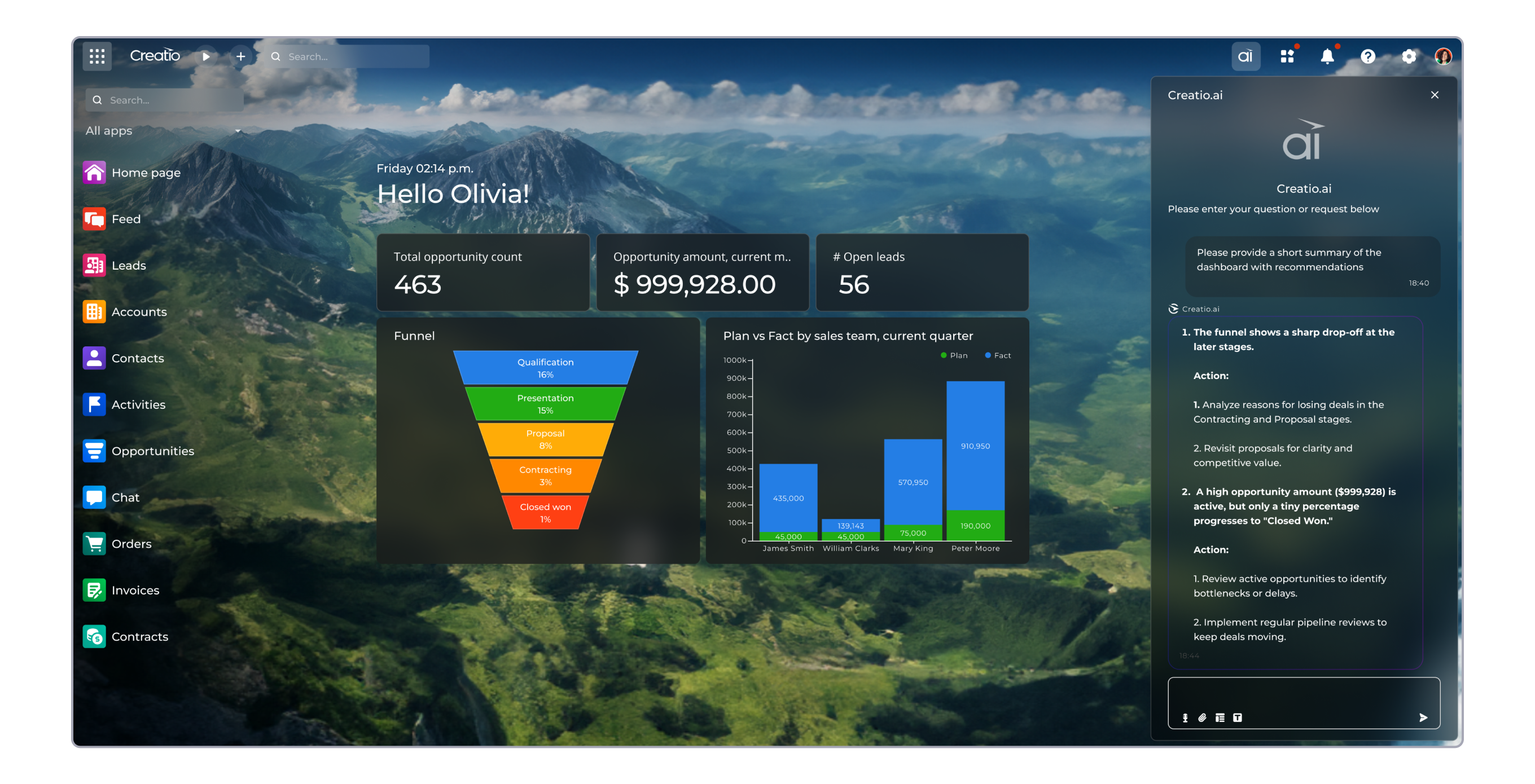
With Creatio Sales, sales teams gain access to a unified workspace that connects customer data, communication history, and performance metrics, providing a comprehensive view of their activities. The platform’s AI agents analyze sales pipelines, forecast outcomes, and suggest next-best actions, empowering sales representatives to focus on the right opportunities at the right time. AI agents also automate routine tasks, such as lead qualification, quote generation, meeting preparation, and follow-ups, reducing manual workload and ensuring every interaction counts.
Built on Creatio’s no-code agentic platform, Creatio Sales is fully customizable, allowing organizations to design, modify, and scale applications, workflows, and custom AI agents without deep technical expertise. Industry research confirms the success of Creatio’s agnetic no-code platform, showing that organizations achieve implementations 70% faster, enjoy a 37% lower TCO, and experience 67% quicker lead response times than with legacy systems.
Whether you’re looking to accelerate deal velocity, enhance forecasting accuracy, or deliver hyper-personalized customer experiences, Creatio Sales gives your team the competitive edge to sell more effectively and efficiently.
The Future of Sales AI
In the near future, as AI technology continues to advance, its integration into sales processes will become deeper, more seamless, and increasingly important for sales teams to succeed.
With Forrester forecasting that the market for AI-driven platforms will grow to $37 billion by 2025, the role of AI in sales will continue to grow, further enhancing efficiency, personalization, and data-driven decision-making.
Key trends shaping the future of AI for sales include:
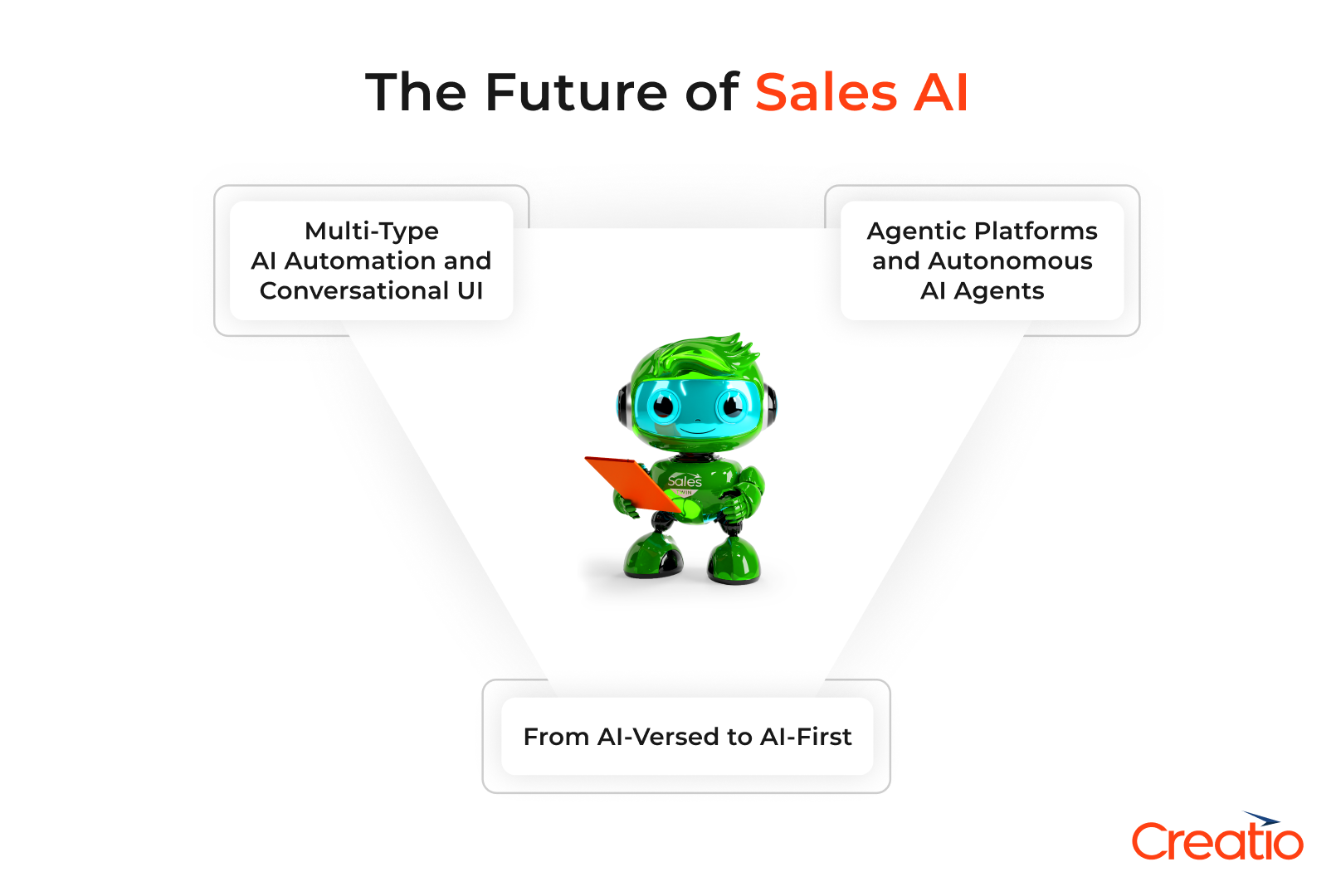
Multi-type AI automation and conversational UI
According to Gartner, by 2028, over 40% of B2B sales organizations will leverage a combination of multiple types of AI technologies to automate sales processes, improve decision-making, and offer more personalized experiences for both sellers and buyers. Additionally, 60% of B2B sales tasks will be executed through conversational user interfaces (UIs) powered by generative AI sales technologies, which enable users to interact with software, apps, and bots in natural language through text and voice.
Agentic platforms and autonomous AI agents
Another key trend highlighted by Gartner is that by 2027, 95% of sellers' research workflows will begin with AI, up from less than 20% in 2024. This shift reflects the rapid rise of agentic platforms and autonomous AI agents, intelligent systems capable of independently conducting research, analyzing data, and generating insights without manual input.
AI agents will not only streamline how sellers prepare for meetings or identify opportunities but will also proactively surface recommendations and execute tasks autonomously, freeing sales professionals to focus on high-value, relationship-driven activities. Sales teams empowered by AI-driven real-time insights will be able to identify opportunities and challenges faster than ever before, helping them stay on top of the competition.
From AI-versed to AI-first
At the same time, Creatio’s The State of AI Agents and no-code report shows that businesses are rapidly moving from being AI-versed to becoming AI-first. Organizations are no longer experimenting with AI; they’re reimagining their operations around it, with 86% of C-level decision-makers believing AI agents will be important to their strategic goals over the next two to three years.
This revolution is fueled by no-code technologies, which enable companies to design, deploy, and scale AI solutions quickly and without technical barriers.
Summary
AI sales tools offer remarkable advantages in automating routine tasks, providing deep insights, and enhancing customer interactions. By leveraging these capabilities, businesses can significantly improve their sales processes, increase sales productivity, achieve higher conversion rates, and generate greater revenue. Creatio stands out as the best and most comprehensive agentic solution for sales thanks to combining robust CRM capabilities with advanced AI-driven sales automation.
Integrating AI tools into your sales strategy can provide a significant competitive edge. By choosing a comprehensive solution like Creatio, you can harness the full potential of sales AI tools to drive your sales growth and achieve outstanding results.





















































